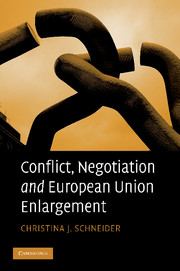Book contents
- Frontmatter
- Contents
- List of Illustrations
- List of Tables
- List of Acronyms
- Acknowledgements
- 1 Introduction
- 2 EU enlargements and transitional periods
- 3 A rationalist puzzle of EU enlargement?
- 4 A theory of discriminatory membership
- 5 EU enlargement, distributional conflicts, and the demand for compensation
- 6 The discriminatory of membership
- 7 Discriminatory membership and intra-union redistribution
- 8 Conclusion
- Bibliography
- Index
5 - EU enlargement, distributional conflicts, and the demand for compensation
Published online by Cambridge University Press: 17 July 2009
- Frontmatter
- Contents
- List of Illustrations
- List of Tables
- List of Acronyms
- Acknowledgements
- 1 Introduction
- 2 EU enlargements and transitional periods
- 3 A rationalist puzzle of EU enlargement?
- 4 A theory of discriminatory membership
- 5 EU enlargement, distributional conflicts, and the demand for compensation
- 6 The discriminatory of membership
- 7 Discriminatory membership and intra-union redistribution
- 8 Conclusion
- Bibliography
- Index
Summary
European Union members and candidates must agree on the implementation of thirty-one common EU policies over the course of enlargement. Most of the time, negotiations on individual chapters go through smoothly. Occasionally, however, an EU member would deliberately delay accession negotiations by vetoing the provisional closure of a particular chapter. The most common reason for such delaying tactics is the need to secure some derogation from the acquis communautaire. As I showed for the Eastern enlargement in 2004 (Chapter 2), EU members and candidates sometimes compromise on the full applicability of the common acquis by granting only restricted membership rights to newcomers.
I now analyze the five successful EU enlargement rounds prior to 2004 in an attempt to assess empirically the correlation between membership applications, distributional conflicts, and enlargement outcomes. There are three specific questions that I investigate in this and the next two chapters of this study:
Why do European Union (EU) members oppose the unconditional accession of some applicants, or, more specifically, why do they demand that new members be given restricted rights in some policy areas? (This chapter.)
If distributional conflicts arise during the accession negotiations, how are they resolved so enlargement can succeed? (Chapter 6.)
What is the relationship between the imposition of discriminatory membership and the intra-Union redistribution of enlargement costs? (Chapter 7.)
- Type
- Chapter
- Information
- Conflict, Negotiation and European Union Enlargement , pp. 77 - 137Publisher: Cambridge University PressPrint publication year: 2008



